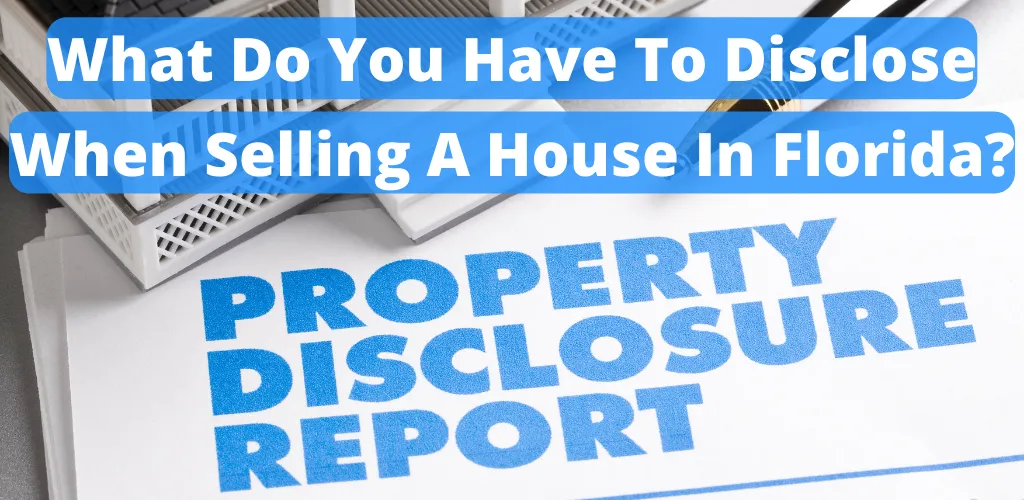
In Florida, the disclosure of specific facts is mandatory. These include material facts that affect market value and defects that the seller knows about. It is illegal to misrepresent these facts on the Florida real estate disclosure form. This form also protects buyers from hidden defects. Sellers must disclose all material facts to prospective buyers.
If you’re selling a home in Florida, you have several different disclosure obligations. You may find that the state requires you to disclose a wide variety of things, including certain types of defects. Be sure to review your situation and see if you have to make any additional revelations before the closing. Disclosure obligations, Caveat emptor, and deadlines for making disclosures are 3 areas you should evaluate when it comes to the importance of disclosing things before the sale. Below I’ll go into them in more detail.
While Florida residential real estate law does not require sellers to disclose all defects, it does say that they must disclose any conditions or issues with a property.
The seller must disclose specific issues that could negatively affect the property’s value in some cases. This includes Chinese drywall, termite damage, and other issues.
However, Florida real estate law does not protect commercial real estate buyers from the same disclosure obligations. So, it is crucial to follow the state laws when selling a Florida house.
For instance, if a house contains lead-based paint, sellers must disclose it. Also, sellers must provide a lead warning statement and pamphlet.
In addition, if the house has a pool, the seller must disclose the location of the pool and its safety features. Further, sellers must disclose any leakages in plumbing and new tanks.
While Florida does not explicitly spell out everything that a seller needs to disclose when selling a house, sellers must disclose any significant defects that might affect a home’s value.
If a seller fails to disclose a significant defect, a buyer might have legal grounds to cancel the contract or sue.
Sellers also must disclose any current or past water damage that the property may have and any plumbing, electrical, and structural problems. Disclosures must be in writing and include photographs.
In addition, sellers should list any property features that the buyer may find problematic or might be hazardous, like mold.
Also, sellers can’t limit their disclosure obligations by only revealing easily visible defects.
Further, in Florida, the seller’s obligation to disclose an unnoticed defect is stipulated under the state’s law. This can be frustrating for the seller and may result in a lawsuit if not adhered to.
Before listing a property, sellers should gather all of the required documents regarding disclosures. Even if a company they hired to make repairs maintains copies of all the documents because a small mistake could reset the three-day clock on the buyer’s right to rescind.
A mistake could jeopardize the entire sale.
Also, sellers have a legal duty to disclose any defects that could affect the buyer’s ability to purchase the property.
Failure to disclose defects or problems can result in severe consequences for both the buyer and seller. Finally, failures to disclose defects can lead to a buyer’s cancellation of the contract or even to a lawsuit from the buyer.

Caveat emptor is a Latin phrase that signifies “let the buyer beware.” (britannica.com) says “in the law of commercial transactions, principle that the buyer purchases at his own risk in the absence of an express warranty in the contract.”
This rule applies to a wide variety of property types. It states that the buyer assumes all risk associated with the property and has no recourse against the seller for any defects or problems.
Caveat emptor does not prohibit sellers from avoiding the responsibility to disclose material defects, but it does require buyers to prove that the seller actively concealed the defect.
A buyer should take every reasonable step to avoid buying a house that the seller has deficiently represented.
Because caveat emptor is a common rule in real estate, it’s essential to understand the legal implications.
Since Caveat emptor does not prohibit sellers from lying about defects, it means that buyers should act cautiously.
Buyers must take reasonable steps to investigate the property and make informed decisions before making an offer on a property, which could possibly limit monetary and buyer's remorse.
The caveat emptor rule is similar when it comes to other commercial sales. It puts the burden of discovery on the buyer to uncover material facts.
Although, as a seller, you may have to take additional steps to protect yourself to avoid being sued. Providing a complete description of all concerns, including any repairs you have made, is vital to protect yourself.
In the past, caveat emptor applied to all real estate sales in Florida. The buyer assumed all risk for the property’s condition.
However, in 1985, the Florida Supreme Court overturned this trend with its Johnson v. Davis decision.
In this case, the seller knew specific facts about the property, which were material to its value and others that were not observable. Thus, the court imposed a seller’s duty to disclose this information to the buyer.
A seller must disclose certain information to the potential buyer in Florida before the sale is finalized.
Also, in Florida, disclosures can be complex and if the seller sells a house as an FSBO (for sale by owner) as an example, they need to be careful. Since A misstep here could cost a seller a great deal of money.
With We Buy Houses Quick & Easy, you can have peace of mind knowing that if we buy your house, we buy as-is, so you don’t have to worry about any of these issues.
In traditional sales, sellers must warn the buyer of any known problems with the house. The seller must also provide a list of these issues to the buyer before closing.
The buyer must then acknowledge all of these disclosures before the sale. In addition, sellers must disclose any pending legal issues with the house, which could affect the property’s value. Having the proper disclosures is vital in the sale of a house.
If you’re selling a house in Florida, be sure to comply with the disclosure rules. You need to disclose any known defects affecting the property’s value. For example, If a seller doesn’t disclose a leaky roof, the buyer might claim fraud. You should also disclose any liens that the city or county has against the property. Lastly, if a buyer discovers you’re hiding a significant problem after the fact, you may be held liable for it.